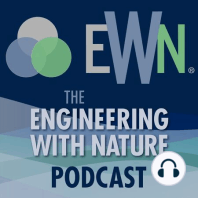28 min listen

The Next Generation Makes the Future of EWN Even Brighter
The Next Generation Makes the Future of EWN Even Brighter
ratings:
Length:
38 minutes
Released:
Nov 3, 2021
Format:
Podcast episode
Description
This episode exemplifies our theme for Season 3 –Creating the Future with EWN. Host Sarah Thorne and Jeff King, Deputy Lead of the Engineering With Nature program at the U.S. Army Corps of Engineers, are talking with three PhD students who are doing truly groundbreaking work: Matt Chambers from the University of Georgia, Joseph Holway from Arizona State University, and Justine McCann from the University of Oklahoma. These students represent three of the academic institutions associated with the Network for Engineering With Nature (N-EWN) initiated in October of 2020. Education and research are at the heart of the N-EWN. In this episode, we discuss the journeys of Matt, Justine, and Joseph–how they got interested in environmental science, engineering, natural infrastructure, EWN, and their plans for the future. Their paths have similarities: a personal interest in the environment, early exposure to environmental issues, finding an academic advisor whose interests aligned with their own, and then pursuing a PhD focused on a passion. These students are committed to making a difference. Joseph describes how, as a child, he fell in love with the Grand Canyon and spent a lot of time there, then spent a semester there as an undergraduate that transformed into a years-long job running around the Grand Canyon doing science. “I was like, wow, you’re going to pay me to do these things? I wanted to work towards being more than a lab technician. I met my advisor, Dr. John Sabo, who was doing work in the Mekong River Basin; and now I’m in Cambodia working with fish and looking at how the amount of water and the timing of the water affects a fishery in Southeast Asia on the Mekong River.” With a background in Mechanical Engineering, Matt struggled to find a long-term path that suited him. He took environmental science courses that aligned with his interest in environmental stewardship. These courses eventually led him to Dr. Brian Bledsoe’s lab where he is working on riverine systems and flood management infrastructure using nature-based features. Dr. Bledsoe is the Director of the Institute for Resilient Infrastructure Systems at the University of Georgia. As Matt describes his work, “Utilizing nature-based features that already perform natural processes that manage floodwaters will be one way that we can make those systems more resilient in the face of climate change.” Justine has a background in geology. A strong field program at Penn State introduced her to the complex problem of mine drainage prevalent in the coal country of Appalachia. After doing some consulting, she found her path forward: “When I heard my current advisor, Dr. Bob Nairn, talking about that at the Geological Society of America meeting, I thought his approach to it was very interesting. because it’s such a low-energy approach to solving such a complex problem. I thought it would be a great fit for me to work on these more innovative strategies.” When talking about the future, the students focused on the key elements of EWN: using science and engineering to produce operational efficiencies to better understand systems and achieve desired outcomes by leveraging natural processes and working collaboratively with local communities. As Justine puts it, “I think that there’s a lot to be said about considering how to work with nature instead of imposing our will on nature. That’s a lot of what EWN is about.” Joseph’s vision is for future generations to be able to appreciate rivers as he does: “I want to work in a space where I can ensure that rivers are going to flow as wild and as free as possible, but it’s kind of balancing all of the services that rivers provide. In places where there's going to be dams, we can manage them in ways that are least to people downstream, whether it’s fishing for livelihoods or recreating on boats.” Joseph is also dedicated to sharing his knowledge and passion by mentoring and teaching future scientists through the NexGen Mekong Sc
Released:
Nov 3, 2021
Format:
Podcast episode
Titles in the series (83)
Incorporating EWN into Coastal Texas Resilience and Restoration: Dr. Edmond Russo, a 27-year veteran of the US Army Corps of Engineers, has a passion for innovation, especially identifying and pursuing new ways to improve efficiency and effectiveness of water resource management activities. In his work at the... by EWN - Engineering With Nature